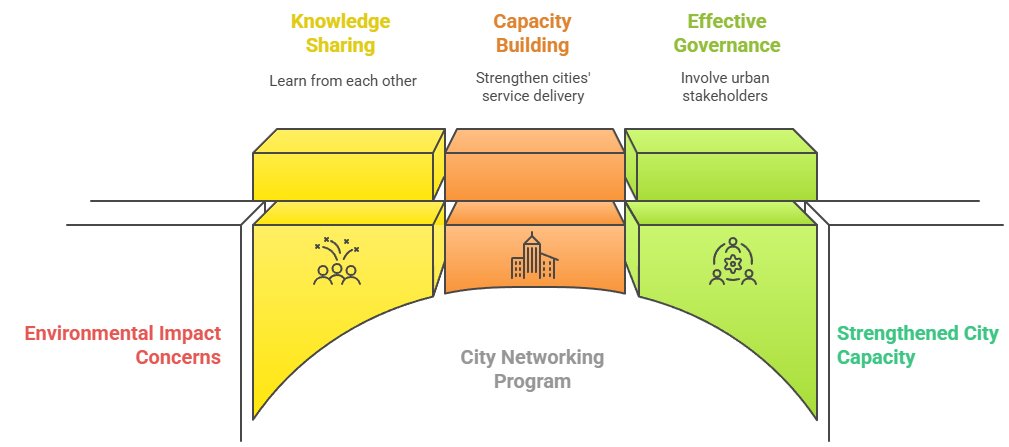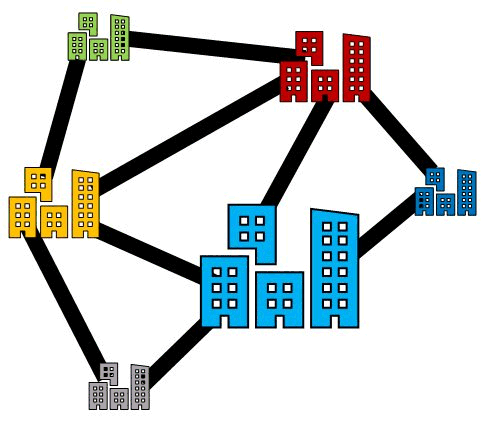|
|
||||||||||
Cities, particularly in developing countries, have also been unable to promote international cooperation with other cities for a variety of financial, political, legislative and other reasons. City-to-city cooperation is vital for exchanging, sharing and transferring technical know-how, expertise and experiences, and to explore the possibilities of cooperation among the various partners in the field of urban management Justifying City Networking There is growing concern on the impacts of human lifestyles and consumption patterns on the global environment. Such concerns have translated themselves into a number of initiatives that has targeted on actions to reduce these impacts on the local environment, particularly in urban areas. Urban environments have also been identified as key 'culprits' for a number of global environmental problems (for example, increased urban traffic causing higher CO2 levels; high resource consumption and ground-water tapping causing desertification; solid waste generation leading to increased land, water and air pollution; etc.). The interlinkages between the causes and effect of urban living and urban lifestyles have helped to understand the importance for local action in tackling global environmental problems. A direct requirement for this to take place is better human skills, knowledge and resource development - and hence the need for greater knowledge and awareness to be built at the individual and household levels, and in cities.
 Figure 1: City Networking for Global Impact The importance of cities to network among themselves stems from the fact that this will be an opportunity for them to learn from each other's experiences and to be exposed to other countries, cultures and urban systems directly, circumventing limitations and restrictions of nationally-coordinated programmes and activities. It is also cities that are the launching arena for global environmental action, and an effective level of subsidiarity for decision-making on managing the environment. The basic objective of a networking programme between cities is to strengthen the cities' capacity to deliver urban services to its residents, and develop effective urban governance and management structures by involving various urban stakeholders. A streamlined management and operational system - strengthened by knowledge gained from networking with other cities - can be used to mobilize local institutional and human resources to meet the growing and complex needs of cities. Need for a New Approach Clearly, there is a need to move away from a one-sided financial/investment-oriented approach of city networking, towards one that emphasizes qualitative partnerships that involves documentation and peer-to-peer transfer of knowledge on urban governance and management between cities in a country or region. The justification for increased urban partnerships lies within cities themselves - increased opportunities for local businesses and companies; greater local autonomy and decision making for internationalization and networking initiatives; deeper cultural ties with the region; etc. Indeed, justification for such transfer of knowledge and skills go beyond mere financial and aid aspects - and involves the development of stable and efficient urban, and hence national, governments and democracies that will also help local and national economies as a whole. There is much that cities can learn from each other directly, but also from a range of non-governmental professionals and urban stakeholders who help in developing cities. Thus, city governments, along with other urban actors such as non-governmental organizations (NGOs) and community-based organizations (CBOs) need to partner with each other to transfer knowledge. City governments in developing countries seek the support of NGOs and civil society organizations for awareness raising and capacity building. As the scope of work of these NGOs gradually widen in light of the corresponding growth in the activities of cities, it has become essential to broaden the knowledge resource base through innovative networking. NGOs have also highlighted the realization that local governments cannot solve local urban problems on their own - they will have to initiate strong horizontal networks and partnerships with various local urban stakeholders such as themselves and local businesses and industry, as well as vertical partnerships with regional and national governments. Of particular relevance is the role of the private sector in urban management. Focal Areas One of the critical programme areas that need to be addressed in cities is the weak institutional and human resource capabilities, which has considerably limited their management capacity and created several barriers and shortcomings in their functioning. It is therefore important as well as essential - in order to enhance their capacity in terms of planning, application of management tools, organization and operation of institutions, development of infrastructure, improvement of the local environment, service delivery to the people as well as to promote international cooperation - that it seek a broad consensual and involved partnerships both locally and internationally. In this connection, there is a clear need to mobilize and utilize the expertise in cities in order to match the needs of other cities requiring such services in the region. Such practice has a number of benefits - better understanding of the problems that city governments in the region are facing, or reorienting strategies in international cooperation. Opportunities need to be provided, through networking and partnership, to use urban management skills and competence in practical and real situations. Broader awareness and knowledge of urban governance issues and its relevance to cities, also needs to be built. Networking and partnerships between urban local governments and other governmental and non-governmental entities (including NGOs, CBOs etc.) remains a critical driver of the above needs. For recipient cities, there is a need to augment human resources and skills for critical urban functions. They will also need to provide an opportunity for cities to build cultural and professional relationships with their counterparts - including those with institutions and organizations in their cities. Examples of city networking There are a number of city networks that have been established over the last few decades. Some of the different types include:
Closer relations with other cities and organizations:
|
||||||||||
|
on |
 |
Return to the City Networks Guide Contact: Hari Srinivas - hsrinivas@gdrc.org |



